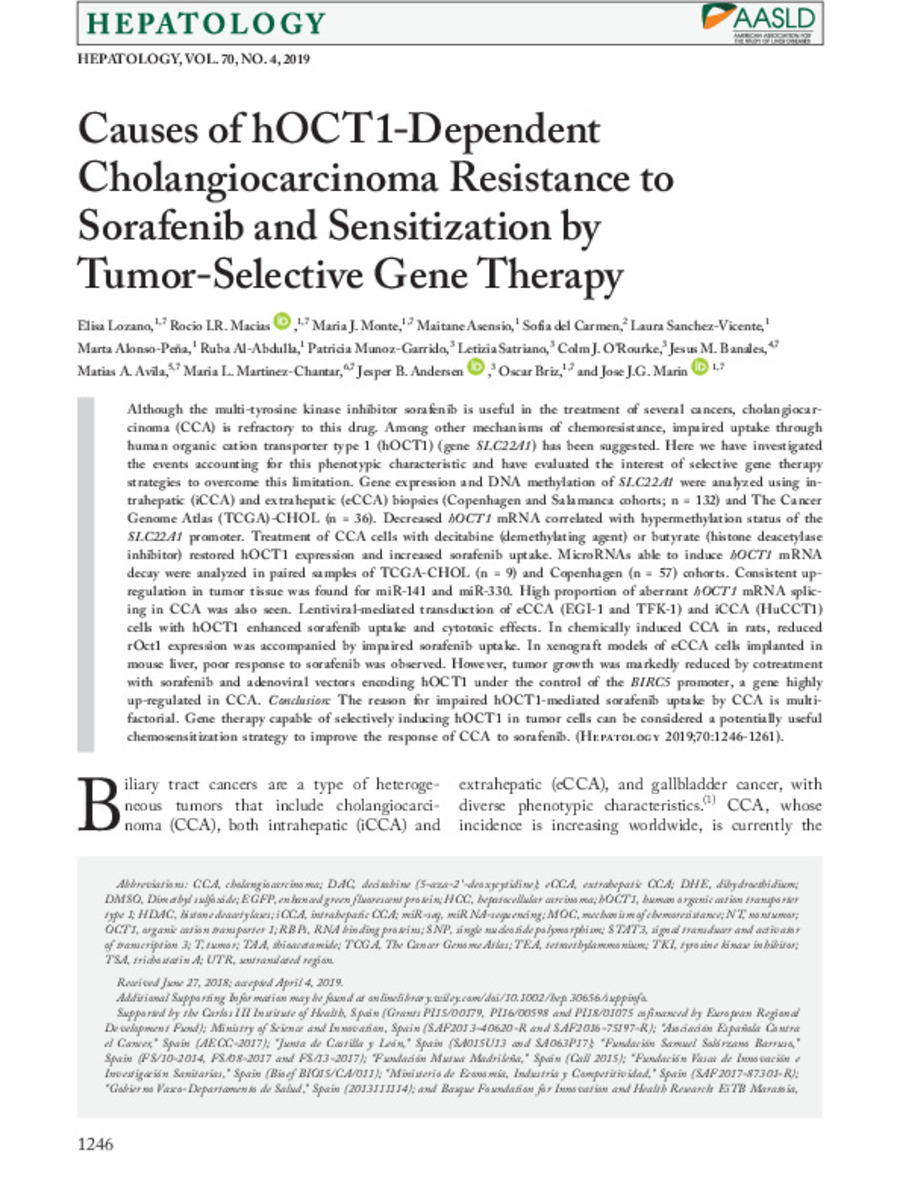Full metadata record
| DC Field | Value | Language |
|---|---|---|
| dc.creator | Lozano, E. (Elisa) | - |
| dc.creator | Macias, R. (Rocío) | - |
| dc.creator | Monte, M.J. (María J.) | - |
| dc.creator | Asensio, M. (Maitane) | - |
| dc.creator | Carmen, S. (Sofia) del | - |
| dc.creator | Sanchez-Vicente, L. (Laura) | - |
| dc.creator | Alonso-Peña, M. (Marta) | - |
| dc.creator | Al-Abdulla, R. (Ruba) | - |
| dc.creator | Munoz-Garrido, P. (Patricia) | - |
| dc.creator | Satriano, L. (Letizia) | - |
| dc.creator | O’Rourke, C.J. (Colm J.) | - |
| dc.creator | Banales, J.M. (Jesús M.) | - |
| dc.creator | Avila, M.A. (Matías Antonio) | - |
| dc.creator | Martinez-Chantar, M.L. (María Luz) | - |
| dc.creator | Andersen, J.B. (Jesper B.) | - |
| dc.creator | Briz, O. (Oscar) | - |
| dc.creator | Marin, J.J.G (Jose J.G.) | - |
| dc.date.accessioned | 2022-03-29T14:26:21Z | - |
| dc.date.available | 2022-03-29T14:26:21Z | - |
| dc.date.issued | 2019 | - |
| dc.identifier.citation | Lozano, E. (Elisa); Macias, R. (Rocío); Monte, M.J. (María J.); et al. "Causes of hOCT1-dependent cholangiocarcinoma resistance to sorafenib and sensitization by tumor-selective gene therapy". Hepatology. 70 (4), 2019, 1246 - 1261 | es |
| dc.identifier.issn | 0270-9139 | - |
| dc.identifier.uri | https://hdl.handle.net/10171/63324 | - |
| dc.description.abstract | Although the multi-tyrosine kinase inhibitor sorafenib is useful in the treatment of several cancers, cholangiocarcinoma (CCA) is refractory to this drug. Among other mechanisms of chemoresistance, impaired uptake through human organic cation transporter type 1 (hOCT1) (gene SLC22A1) has been suggested. Here we have investigated the events accounting for this phenotypic characteristic and have evaluated the interest of selective gene therapy strategies to overcome this limitation. Gene expression and DNA methylation of SLC22A1 were analyzed using intrahepatic (iCCA) and extrahepatic (eCCA) biopsies (Copenhagen and Salamanca cohorts; n = 132) and The Cancer Genome Atlas (TCGA)-CHOL (n = 36). Decreased hOCT1 mRNA correlated with hypermethylation status of the SLC22A1 promoter. Treatment of CCA cells with decitabine (demethylating agent) or butyrate (histone deacetylase inhibitor) restored hOCT1 expression and increased sorafenib uptake. MicroRNAs able to induce hOCT1 mRNA decay were analyzed in paired samples of TCGA-CHOL (n = 9) and Copenhagen (n = 57) cohorts. Consistent up-regulation in tumor tissue was found for miR-141 and miR-330. High proportion of aberrant hOCT1 mRNA splicing in CCA was also seen. Lentiviral-mediated transduction of eCCA (EGI-1 and TFK-1) and iCCA (HuCCT1) cells with hOCT1 enhanced sorafenib uptake and cytotoxic effects. In chemically induced CCA in rats, reduced rOct1 expression was accompanied by impaired sorafenib uptake. In xenograft models of eCCA cells implanted in mouse liver, poor response to sorafenib was observed. However, tumor growth was markedly reduced by cotreatment with sorafenib and adenoviral vectors encoding hOCT1 under the control of the BIRC5 promoter, a gene highly up-regulated in CCA. Conclusion: The reason for impaired hOCT1-mediated sorafenib uptake by CCA is multifactorial. Gene therapy capable of selectively inducing hOCT1 in tumor cells can be considered a potentially useful chemosensitization strategy to improve the response of CCA to sorafenib. | es_ES |
| dc.description.sponsorship | Supported by the Carlos III Institute of Health, Spain (Grants PI15/00179, PI16/00598 and PI18/01075 cofinanced by European Regional Development Fund); Ministry of Science and Innovation, Spain (SAF2013-40620-R and SAF2016-75197-R); “Asociación Española Contra el Cancer,” Spain (AECC-2017); “Junta de Castilla y León,” Spain (SA015U13 and SA063P17); “Fundación Samuel Solórzano Barruso,” Spain (FS/10-2014, FS/08-2017 and FS/13-2017); “Fundación Mutua Madrileña,” Spain (Call 2015); “Fundación Vasca de Innovación e Investigación Sanitarias,” Spain (Bioef BIO15/CA/011); “Ministerio de Economía, Industria y Competitividad,” Spain (SAF2017-87301-R); “Gobierno Vasco-Departamento de Salud,” Spain (2013111114); and Basque Foundation for Innovation and Health Research: EiTB Maratoia, Spain (BIO15/CA/016/BD). E.L. was supported by a postdoctoral contract by “University of Salamanca,” Spain (2018). M.A. and M.A.P. were supported by a predoctoral contract by “Ministry of Education, Culture and Sports,” Spain (BOE-A-2015-9456). R.A.A. was supported by a predoctoral contract funded by the “Junta de Castilla y León, Fondo Social Europeo” (EDU/828/2014). J.B.A. is supported by the Danish Cancer Society (R98-A6446); Novo Nordisk Foundation (14040); P.M.G.: European Association for the Study of the Liver (EASL) individual Sheila Sherlock Postdoc Fellowship, Marie Sklodowska-Curie Fellowships (MirChol and Epi-Target). C.J.O. is funded by MSCA postdoc fellowship. | es_ES |
| dc.language.iso | eng | es_ES |
| dc.publisher | Wiley | es_ES |
| dc.rights | info:eu-repo/semantics/openAccess | es_ES |
| dc.subject | Multi-tyrosine | es_ES |
| dc.subject | Several cancers | es_ES |
| dc.subject | Cholangiocarcinoma (CCA) | es_ES |
| dc.subject | Mechanisms of chemoresistance | es_ES |
| dc.title | Causes of hOCT1-dependent cholangiocarcinoma resistance to sorafenib and sensitization by tumor-selective gene therapy | es_ES |
| dc.type | info:eu-repo/semantics/article | es_ES |
| dc.identifier.doi | 10.1002/hep.30656 | - |
| dadun.citation.endingPage | 1261 | es_ES |
| dadun.citation.number | 4 | es_ES |
| dadun.citation.publicationName | Hepatology | es_ES |
| dadun.citation.startingPage | 1246 | es_ES |
| dadun.citation.volume | 70 | es_ES |
Files in This Item:
Statistics and impact
Items in Dadun are protected by copyright, with all rights reserved, unless otherwise indicated.






